
Edwin C. Barnes was determined not just to work for Thomas Edison, but to work with him. His ambition was clear and unwavering he knew that he would make it happen, no matter what obstacles stood in his way. However, two significant challenges loomed: he didn’t know Edison personally, and he lacked the funds to travel to Orange, New Jersey, where Edison was based. Undeterred by his financial situation, Barnes took a freight train instead of a passenger train, driven by his resolve to meet the great inventor.
When he arrived at Edison’s office, Barnes boldly declared his intention to go into business with him. Many would have given up in the face of such challenges, especially without financial backing. Yet, Barnes overcame these obstacles through sheer determination something that lies within all of us. Just like Barnes, we can find alternative paths to reach our goals, even if it means taking a less conventional route.
What truly made the difference was the impression Barnes left on Edison. Edison saw in Barnes a man who had made up his mind to succeed, no matter how long it took. This determination was something Edison could not ignore. It wasn’t just a superficial desire; it was a deep, burning passion that was impossible to fake. Barnes didn’t immediately achieve his dream of working directly with Edison, but he was given an opportunity to be close to him enough to keep his dream alive.
The lesson here is powerful: when you pursue something with genuine passion and determination, others will notice. Like Barnes, we should approach our goals with a full heart and unwavering focus, not half-heartedly. The journey may not be easy, but the opportunity will come to those who are truly committed.
“When one is truly ready for a thing, it puts in its appearance”
If you truly desire something, your appearance and actions will naturally align with that goal. It was evident to everyone that Edwin was determined to work with Edison, simply by the way he conducted himself around the office. When you’re truly ready for something, the wait doesn’t bother you because, in your mind, you know it’s just a matter of time. This highlights the importance of having a clear purpose and sticking to it until it becomes an all-consuming passion.
"Opportunity has a cunning way of sneaking in through the back door, often disguised as misfortune or temporary defeat."
Opportunities rarely come in the form we expect. Many people mistakenly believe that opportunities will be obvious, like gifts handed out by some benevolent deity of wealth. However, this is rarely the case. Most opportunities are hidden within challenges, which is why many people fail to recognize them.

The lesson from the story of Edwin and Edison is that a mere thought or idea, when combined with determination and persistence, can be transformed into a tangible reality. Edwin had nothing at the outset except a clear vision of what he wanted and the unwavering resolve to pursue it until it became a reality.
Three Feet from Gold
"Three Feet from Gold" is a powerful reminder that one of the most common reasons for failure is the tendency to give up when faced with temporary setbacks. Often, success is just within reach, but it eludes those who quit too soon.

We all encounter this challenge at some point, and I’ve personally fallen into this trap multiple times—most recently about a month ago. I was set on creating an online course about artificial intelligence, but I gave up when faced with the first major obstacle.
There’s a story about R. U. Darby’s uncle who, during the gold rush, was eager to strike it rich. He found some promising ore and invested heavily in mining equipment. However, when the ore vein ran out, he and his team were disheartened and decided to quit. They sold their equipment to a “junk man” for a fraction of its value. This “junk man” then consulted a mining engineer, who advised him to keep digging. It turned out that the ore vein was just three feet deeper. The “junk man” ended up extracting millions of dollars in ore because he sought expert advice before giving up.
Darby later reflected on this experience in his work as a life insurance salesman, saying, “I stopped three feet from gold, but I will never stop just because someone says ‘no’ when I ask them to buy insurance.”
The greatest successes often come just one step beyond the point of defeat. One of humanity’s major flaws is our tendency to accept the word “Impossible.” We become familiar with all the reasons something cannot be done. Instead, we need to challenge and disregard these limitations.

We are the architects of our destiny and the stewards of our spirit because we have the power to shape our thoughts and emotions. Our minds become attuned to the prevailing thoughts we harbor, and we must infuse them with a powerful desire for wealth. This desire should be so intense that it compels us to devise concrete plans for achieving it.
Chapter 2: Desire
"A strong feeling of wanting to have something or wishing for something to happen."

When you achieve success, people often see only the final triumph, overlooking the countless hours of hard work that led to it. For instance, after earning each degree, your name may appear on a certificate, but the late nights spent studying in the library are often forgotten. If you want others to recognize your sacrifices, make sure you don’t overlook acknowledging theirs in return.
To truly succeed, you need to set a clear, specific goal and commit all your energy, willpower, and effort to achieving it. The power of a strong, definite desire is incredible. Consider Edwin’s story: his success came because he eliminated any possibility of retreat, leaving himself no option but to succeed or fail completely. When you have a fallback plan, it’s easy to give up when faced with difficulties. Committing fully with only two outcomes—success or failure—can be a crucial factor in reaching your goals.
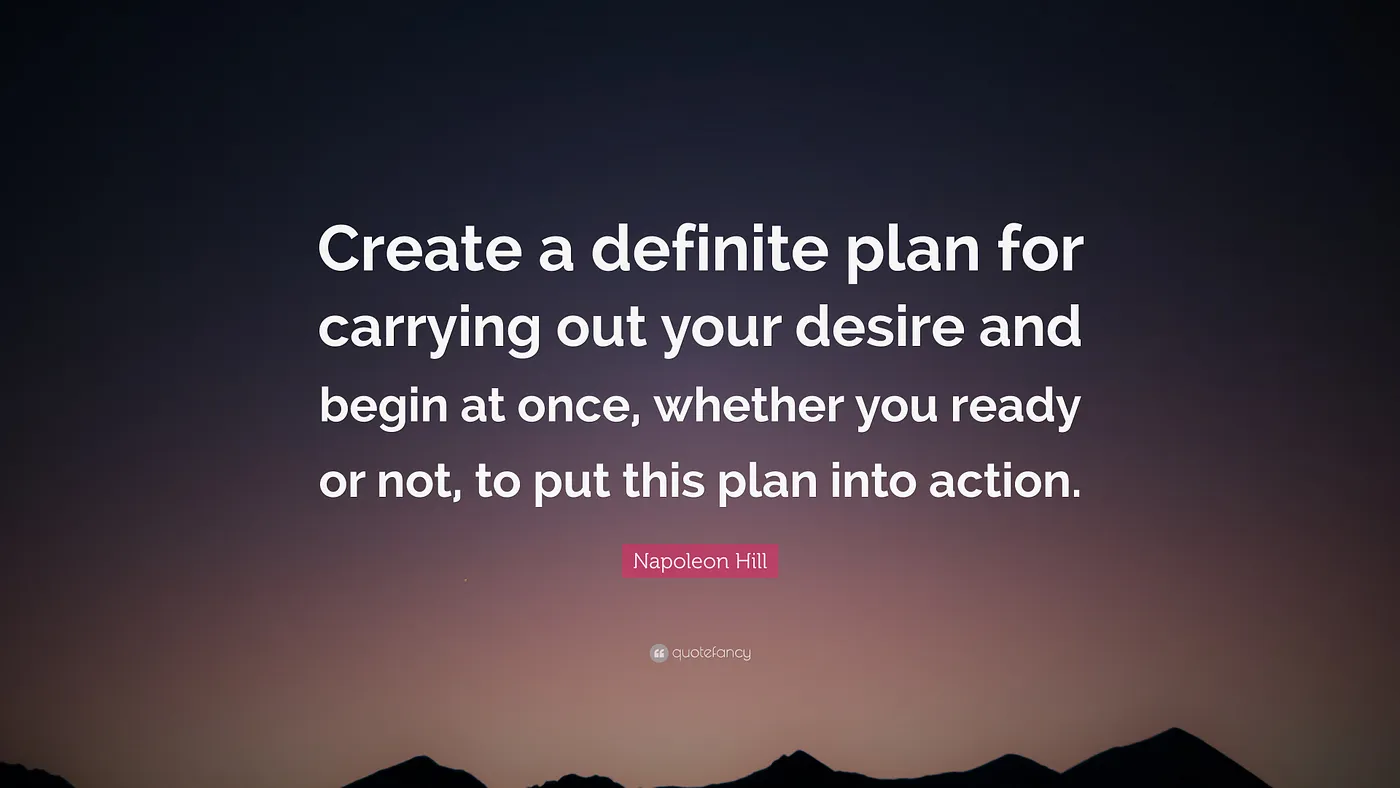
We all recognize the value of money and many of us wish for it. However, wishing alone won’t bring wealth. To attract riches, you need an intense desire that borders on obsession, along with a definite plan and unwavering persistence. Here are six steps to transform desire into wealth:
- Define Your Goal: Clearly state the exact amount of money you want. For instance, “I want to earn 20 million rand.”
- Identify Your Exchange: Determine what you are willing to give in return for the money you seek. What sacrifices are you prepared to make?
- Set a Deadline: Establish a specific date by which you intend to achieve your financial goal.
- Create a Plan: Develop a concrete plan to reach your goal and start implementing it immediately, regardless of whether you’re fully prepared.
- Write It Down: Document your goal and plans clearly.
- Affirm Daily: Read your written statement aloud twice daily—once before bed and once upon waking.
To amass wealth, you must develop a “money consciousness”—a mindset deeply immersed in the desire for money, where you can envision yourself already in possession of it. These steps are essential for achieving any specific goal.
Post-COVID-19, economies may falter, bringing everyone to a similar starting point. A new era is beginning, one that favors innovation and bold ideas. The pandemic has signaled the end of an old age and the dawn of a new one. To excel in this new world, channel the spirit of past pioneers.
“Success requires no apologies, and failure permits no excuses.”
The modern world is ready to reward those who bring new ideas. Remember, “No one is defeated until they accept defeat as reality.”
Chapter 3: Faith
"Visualization and belief in achieving your desires"
Faith is a mental state that can be cultivated through affirmation and repeated suggestions to your subconscious mind. By persistently affirming your goals, you can develop a strong sense of faith. This faith is crucial for translating your desires into reality. Act as if you have already achieved your goal, and let positive emotions dominate your mind while eliminating negative ones.
Self-Confidence Formula
- Commit to Action: Believe in your ability to achieve your goals. Commit to persistent, continuous action toward your objectives.
- Visualize Your Success: Spend thirty minutes daily focusing on the person you aim to become, creating a clear mental image.
- Develop Confidence: Allocate ten minutes daily to building self-confidence through autosuggestion.
- Document Your Aim: Clearly write down your main goal and persist until you have developed enough self-confidence to achieve it.
- Build on Truth and Justice: Ensure that your wealth and position are founded on truth and fairness. Believe in yourself and others to inspire belief in you.
Just as the wind determines the direction of a ship, your thoughts—guided by autosuggestion—will shape your success.
Chapter 4: Autosuggestion
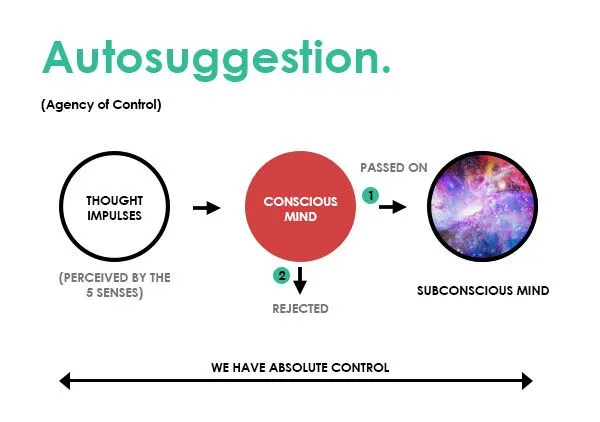
Autosuggestion refers to the process of influencing your subconscious mind through self-administered stimuli that reach your senses. Merely reading words is not effective unless you infuse them with strong emotions or feelings. Your subconscious responds only to thoughts that are deeply felt and emotionally charged.
Influencing your subconscious mind requires effort, and there are no shortcuts. You must determine if the rewards you seek are worth the effort required to achieve them. The only limits to your mind are those you accept; both successes and failures are products of thought.
Don’t wait for a fully formed plan to exchange services or goods for the money you desire. Instead, start visualizing yourself already in possession of the money. Trust that your subconscious mind will provide the necessary plans. Stay alert for these plans, which may come as sudden inspirations. Treat these flashes of insight with respect and act on them promptly, as failure to do so can jeopardize your success.
Summary of Instructions
- Find a Quiet Space: Go to a quiet place where you won’t be disturbed, close your eyes, and repeat aloud the amount of money you wish to accumulate, the deadline for achieving it, and the service or merchandise you plan to offer in return.
- Visualize Your Goal: Repeat this affirmation both morning and night until you can vividly imagine the money you aim to acquire.
- Write It Down: Place a written copy of your statement where you can see it daily. Read it before going to bed and upon waking until it becomes ingrained in your memory.
- Master Yourself: Understand that you can master yourself and your environment by influencing your subconscious mind, which, in turn, can help you gain the cooperation of your sixth sense.
Chapter 5: Specialized Knowledge

From personal experiences and observations, it’s clear that many professors, despite their vast knowledge, often have limited financial success. They excel in teaching and disseminating knowledge but may lack expertise in organizing and applying that knowledge for financial gain. Knowledge alone is potential power; it becomes effective only when it’s organized into actionable plans and directed towards specific goals.
Being educated goes beyond having a wealth of general or specialized knowledge. True education is about developing the mental faculties to acquire what you want or its equivalent without infringing on others’ rights. An educated person knows how to find knowledge when needed and how to structure it into actionable plans.
Acquiring Specialized Knowledge
Identify Your Needs: Determine the specific type of specialized knowledge you need and the purpose for which it is intended.
Sources of Knowledge:
- Personal experience and education.
- Cooperation with others.
- Formal education from colleges and universities.
- Public libraries and online resources.
- Online courses and training programs.
Purpose-Driven Learning: If you consider further schooling, clarify your purpose first. Seek out reliable sources that offer the knowledge you need for your goals.
Continuous Learning: Successful individuals in any field continue to acquire specialized knowledge related to their goals or professions. The mistake many make is believing that learning stops after formal education. In reality, education merely lays the foundation for ongoing practical learning.
Value of Effort: Knowledge acquired with effort and cost is often more valued. The discipline gained from a structured study program compensates for opportunities lost when knowledge was freely available. Humans tend to value what they invest in.
Leadership and Ambition: Those who dedicate spare time to home study often possess leadership qualities. Ceasing to study after formal education typically leads to mediocrity. The path to success is a continuous pursuit of knowledge.
Avoiding Rut: Starting from the bottom and working up may seem practical, but those who stay at the bottom often fail to see opportunities and become stuck in routine. To rise or remain stagnant is often a result of conditions we can control if we choose to.
Key Takeaways
- Idea Over Knowledge: The core of success often lies in the idea itself. Specialized knowledge can be found in many places, sometimes just around the corner.
- Habits: Success and failure are largely shaped by habits. Forming productive habits and continuously pursuing knowledge can significantly impact your success.
Chapter 6: Imagination

While synthetic imagination—combining existing ideas in new ways—will be your primary tool for turning desire into money, you might also encounter situations that call for creative imagination, which involves generating entirely new ideas.
To transform a mere desire into tangible wealth, you need a well-developed plan, or multiple plans, conceived through the use of imagination. Ideas are the foundation of all wealth, and they originate from the imaginative process.
Important Points:
Imagination and Wealth: Ideas, birthed from imagination, are the starting points of all fortunes. Hard work and honesty alone do not guarantee riches. Wealth typically responds to specific demands, guided by the application of well-defined principles, rather than luck.
Value of Ideas: There is no fixed price for ideas; the creator determines their value. Riches come not from mere labor but from the application of ideas that meet specific needs.
Role of Luck: While a lucky break might offer an opportunity, relying solely on luck is not a reliable strategy. The most dependable approach is to actively create and act on ideas rather than waiting for chance events.
Power of Ideas: Once given life and direction, ideas gain their own momentum and can overcome obstacles. Although ideas themselves are intangible, they possess more influence than the physical minds that generate them. They have the potential to endure beyond the creators themselves.
Success and Failure: Success requires no justification, while failure offers no excuses. The focus should be on creating and acting on ideas, rather than explaining or rationalizing outcomes.
In essence, harnessing the power of imagination and ideas is crucial for achieving significant success and wealth.
Chapter 7: Organized Planning
The crystallization of desire into action.

To effectively transform a desire into tangible success, especially financial success, you need a practical and well-organized plan. Here’s how to build and execute such plans:
Form a Team: Assemble a group of individuals whose skills and expertise complement your own. This team, or Master Mind group, will be crucial in developing and implementing your plans for accumulating wealth.
Offer Value: Determine and offer specific benefits or advantages to the members of your group in exchange for their cooperation. Ensuring that everyone feels valued and rewarded is key to maintaining their commitment.
Regular Meetings: Schedule regular meetings with your Master Mind group, at least twice a week. Consistent communication and collaboration are essential for refining and executing your plans.
Maintain Harmony: Ensure that relationships within the group are harmonious. Conflict or discord can undermine the effectiveness of the plan and the group’s ability to work together effectively.
Develop Faultless Plans: Strive to create and refine plans that are as comprehensive and error-free as possible. The quality of your plans significantly impacts your success.
Adapt and Persist: If your initial plan fails, replace it with a new one. The key is persistence and adaptability. Many people fail because they do not persist in creating new plans when the first ones don’t work.
View Defeat as Temporary: Understand that temporary setbacks are not permanent failures. Use them as signals that your plans need adjustment. Rebuild your plans and continue moving toward your goal.
Mental Resilience: Your success is limited only by the soundness of your plans and your mental resilience. You are not truly defeated until you give up in your own mind.
Keep Pushing Forward: If you encounter defeat, treat it as an opportunity to refine your approach and try again. The only way to fail permanently is to quit. As long as you keep moving forward, you remain in the game.
Money as a Response: Remember, money itself is inert. It has no inherent ability to act or move on its own. It responds to those who actively seek and call for it through well-thought-out plans and persistent effort.
In summary, practical planning involves assembling a capable team, offering mutual benefits, maintaining harmony, and persisting through challenges. Success comes from the continuous refinement of plans and the unwavering commitment to your goals.
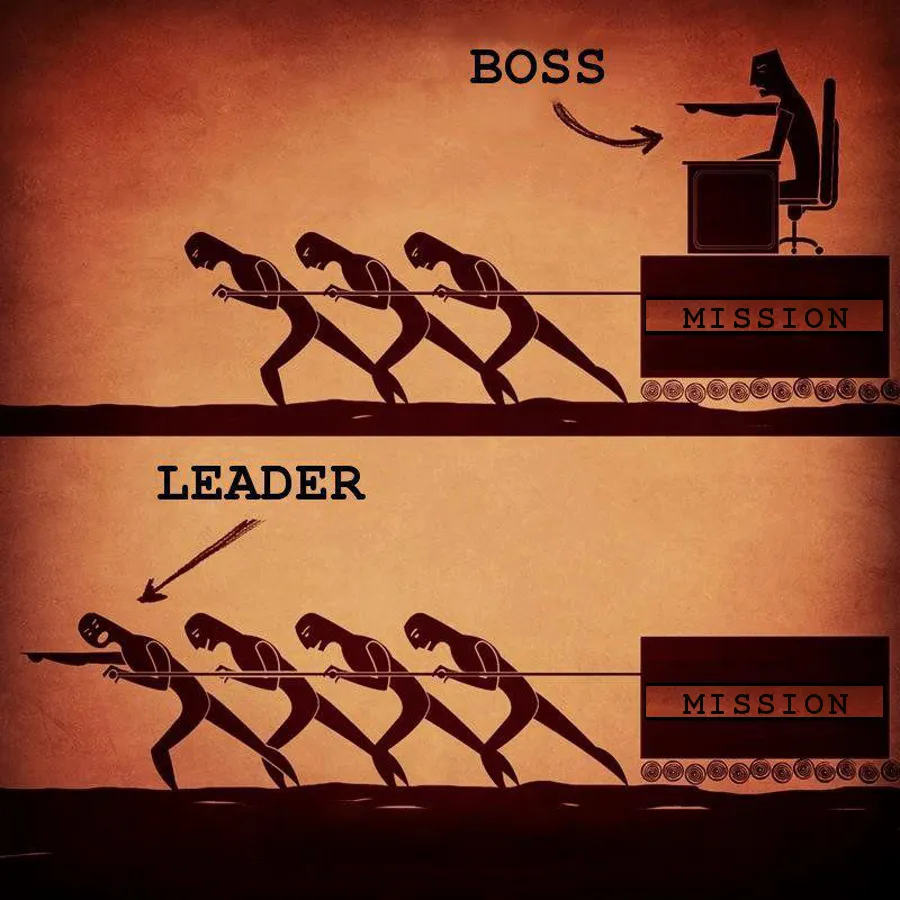
In considering whether to be a leader or a follower, it’s crucial to understand the significant differences in compensation and responsibility between the two roles. Followers, while essential, typically receive less compensation than leaders. However, many leaders start as followers and rise to prominence by excelling in their initial roles.
Key Factors of Leadership:
- Unwavering Courage: Confidence in oneself and one’s field is essential.
- Self-Control: The ability to manage oneself and one’s emotions.
- Keen Judgment: Making sound decisions based on analysis and experience.
- Definiteness of Decision: Making clear, firm decisions.
- Definiteness of Plans: Creating and sticking to well-defined plans.
- Habit of Doing More Than Paid For: Going above and beyond the minimum requirements.
- Pleasing Personality: Being personable and approachable.
- Sympathy and Understanding: Demonstrating empathy towards others.
- Mastery of Detail: Paying attention to and mastering the specifics.
- Responsibility: Willingness to take full responsibility for outcomes.
- Cooperation: Working well with others and fostering teamwork.
What Leaders Should Avoid:
- Inability to Organize Details: Poor organizational skills can hinder success.
- Unwillingness to Render Humble Services: Avoiding tasks that may seem beneath them.
- Expectation of Pay for Knowledge: Compensation should be based on actions, not just knowledge.
- Lack of Imagination: Failing to think creatively and innovate.
- Selfishness: Prioritizing personal gain over the welfare of others.
- Intemperance: Avoiding excessive behavior or habits.
- Disloyalty: Being unfaithful to the team or organization.
- Emphasis on Authority: Relying on position rather than leadership qualities.
- Emphasis on Title: Focusing on status rather than performance.
Marketing Services:
- Employment Bureaus: Use these agencies to connect with potential employers or clients.
- Advertising: Promote services through newspapers, trade journals, magazines, and radio.
- Personal Letters: Directly apply to firms or individuals who might need your services.
- Personal Acquaintances: Leverage your network for opportunities.
- In-Person Applications: Visit potential clients or employers to make a direct impression.
- Written Briefs: Provide a concise summary of your services and qualifications.
Choosing between leadership and followership involves understanding these distinctions and preparing accordingly. Effective leaders not only avoid common pitfalls but also actively seek to build and market their services through various channels.

To secure the position you desire, approach the process with meticulous care. Here’s a guide to help you stand out:
Preparing Your Application:
- Education and Experience: Highlight your qualifications and experiences that are most relevant to the position you’re aiming for.
- References: Include references who can vouch for your abilities and character.
- Photograph: A professional photo can help personalize your application.
- Apply for a Position: Tailor your application specifically for the role you’re interested in.
- State Your Qualifications: Clearly outline what makes you a strong candidate.
- Offer to Work on Probation: Propose to work for free initially to prove your value if necessary.
- Know the Employer: Research the company’s business thoroughly to tailor your approach.
Crafting Your Proposal:
- Define Your Job: Be specific about the role you want. If it doesn’t exist, propose how you can create it.
- Target the Right Employer: Choose the company or individual who aligns with your goals.
- Study the Employer: Understand their policies, personnel, and growth opportunities.
- Offer Value: Think about what you can bring to the table and present ideas that can benefit the company.
- Focus on Contribution: Concentrate on how you can add value rather than just seeking a job.
- Detail Your Plan: Write out your proposal in a clear, organized manner.
- Present Your Proposal: Deliver it to someone with decision-making authority.
Tips for Success:
- Prepare Thoroughly: Like a lawyer preparing a case, the success of your application depends on how well you present yourself.
- First Impressions Matter: Dress professionally and make a strong initial impact.
- Go-Giver, Not Just Go-Getter: Focus on how you can give value rather than just what you want.
Understanding Your Value:
- Brain Capital: Your knowledge and skills are invaluable assets. Effective use of your talents can yield significant returns, often more valuable than physical capital.
- Ideas Over Luck: Success often follows from well-developed ideas rather than luck.
Avoiding Failure:
- Recognize Common Pitfalls: Understand and address reasons for failure like lack of purpose, procrastination, or poor self-discipline.
- Self-Analysis: Regularly assess your strengths and weaknesses to continuously improve.
Self-Analysis Questionnaire:
- Goal Achievement: Did you meet your yearly objectives?
- Service Quality: Was the service you provided of the highest quality?
- Quantity of Service: Did you maximize your output?
- Conduct: Were you consistently cooperative and harmonious?
- Procrastination: Did you let procrastination hinder your efficiency?
- Personality Improvement: How have you improved personally?
- Persistence: Were you consistent in following through with your plans?
- Decision-Making: Did you make prompt and definite decisions?
- Fears: Did fears affect your performance?
- Cautiousness: Were you appropriately cautious in your approach?
- Relationships: Were your work relationships positive or negative?
- Focus: Did you concentrate your efforts effectively?
- Open-Mindedness: Were you tolerant and open-minded?
- Service Improvement: How have you enhanced your ability to serve?
- Habits: Were your habits temperate and not detrimental?
- Egotism: Did you display any egotism?
- Respect: Did you earn respect from colleagues?
- Decision Basis: Were your decisions based on thought or guesswork?
- Budgeting: Did you effectively budget your time and resources?
- Unproductive Time: How much time was wasted on unproductive activities?
- Rebudgeting: How can you adjust your time and habits for better efficiency?
- Conscience: Have you acted in accordance with your conscience?
- Fairness: Were you fair to others?
- Service Quality: Did you render more and better service than expected?
- Self-Satisfaction: Would you be satisfied with your own services if you were the client?
- Vocation: Are you in the right field, and if not, why?
- Client Satisfaction: Was the client satisfied with your services?
- Success Principles: What is your current standing on the principles of success?
Moving Forward:
Opportunity is at your doorstep. Choose what you want, craft a detailed plan, and pursue it with relentless persistence.
Chapter 8: Decision
The mastery of procrastination.

The role of decisiveness in achieving success cannot be overstated. The absence of firm decisions is a major contributor to failure, and procrastination often serves as its close ally. Here’s how you can conquer the habit of procrastination and develop decisive action:
Understanding Procrastination and Decision-Making
Procrastination vs. Decision: Procrastination is the enemy of decision-making. People who struggle financially often delay making decisions, frequently changing their minds and allowing themselves to be swayed by others’ opinions.
Influence of Opinions: Many people let external opinions shape their decisions. This reliance on others’ viewpoints can dilute personal desire and hinder progress. Opinions are easy to come by and often misleading, making it crucial to develop independent thought and decision-making.
Value of Your Own Judgment: Trust your own brain and mind to make decisions. Seek facts and information when needed, but keep your purpose discreet. Over-disclosure can lead to unwanted interference and defeat.
Developing Decisiveness
Act Quickly and Firmly: Leaders are distinguished by their ability to make decisions swiftly and confidently. They know what they want and act decisively, setting them apart from those who hesitate and waver.
Courage to Decide: Making firm decisions often requires significant courage. Decisiveness is not just about choosing a path but about committing to it with determination, even when facing uncertainty or opposition.
Prepare and Plan: Before making a decision, prepare thoroughly. Understand what you want to achieve, gather necessary information, and plan how to reach your goal.
Keep Plans Discreet: While it’s important to communicate your intentions, avoid discussing them too much before taking action. This prevents others from undermining your plans and keeps your strategies intact.
Action Steps to Enhance Decision-Making
Set Clear Goals: Define exactly what you want to achieve. A clear goal provides direction and helps in making decisive actions.
Gather Information: Obtain the facts and data you need to make an informed decision, but avoid being paralyzed by excessive information.
Practice Decision-Making: Regularly practice making decisions, even in small matters. This builds confidence and reduces hesitation.
Commit to Your Decisions: Once a decision is made, commit to it fully. Follow through with your plans and be prepared to adapt as necessary, but don’t waver.
Learn from Experience: Analyze past decisions to understand what worked and what didn’t. Use these insights to improve your future decision-making.
By fostering the ability to make decisions promptly and with confidence, you set yourself on a path to success. Decisiveness not only helps in personal growth but also in achieving financial independence and professional advancement.
Chapter 9: Persistence
The sustained effort necessary to induce faith

Persistence is a critical element in achieving success and turning desires into tangible results, especially when it comes to financial success and personal goals. Here’s a deeper look into the role of persistence and how to cultivate it:
The Importance of Persistence
Foundation of Success: Persistence is often the key factor that separates successful individuals from those who fail. It’s not just about starting but continuing despite setbacks. Persistence is built on willpower and a strong desire to achieve goals.
Persistence vs. Failure: Lack of persistence is a common cause of failure. Many people give up too soon, especially when faced with obstacles. Persistence involves sticking with your goals through difficulties and failures.
The Role of Desire: A strong, burning desire is crucial for persistence. Weak desires result in weak efforts. The more intense your desire, the stronger your persistence will be.
Building and Cultivating Persistence
Definite Purpose: Clearly define what you want to achieve. A well-defined purpose gives direction and focus, making it easier to maintain persistence.
Strengthen Your Desire: Keep your desire alive by constantly reminding yourself of your goals and the reasons behind them. Visualize your success and the benefits it will bring.
Develop Self-Reliance: Trust in your abilities and judgments. Self-reliance reinforces confidence and helps you stay motivated even when faced with challenges.
Create a Plan: Develop a detailed plan for achieving your goals. Having a plan helps in maintaining focus and provides a roadmap to follow.
Seek Accurate Knowledge: Avoid guessing and ensure that your decisions are based on accurate information. Knowledge builds confidence and reduces the likelihood of failure.
Build Cooperation: Surround yourself with supportive people who can help you achieve your goals. Collaboration can provide new perspectives and keep you motivated.
Cultivate Willpower: Willpower is essential for persistence. Strengthen it by setting small goals and achieving them, gradually increasing your capacity for self-discipline.
Develop Persistence as a Habit: Persistence becomes easier with practice. Start by persisting in small tasks and gradually apply this habit to larger goals.
Overcoming Setbacks
Learn from Failure: Understand that failure is not the end but a step towards success. Each failure provides valuable lessons and opportunities for growth.
Reframe Defeats: See every setback as a chance to reassess and improve. Each failure brings with it the seed of an equivalent advantage, leading to future success.
Stay Focused: Keep your eyes on your goal and continue working towards it, even when progress seems slow. Persistence involves maintaining focus and resilience.
By integrating these principles into your daily routine and mindset, you can enhance your ability to persist and ultimately achieve your desired outcomes. Persistence is not just about enduring but about consistently working towards your goals with unwavering determination.
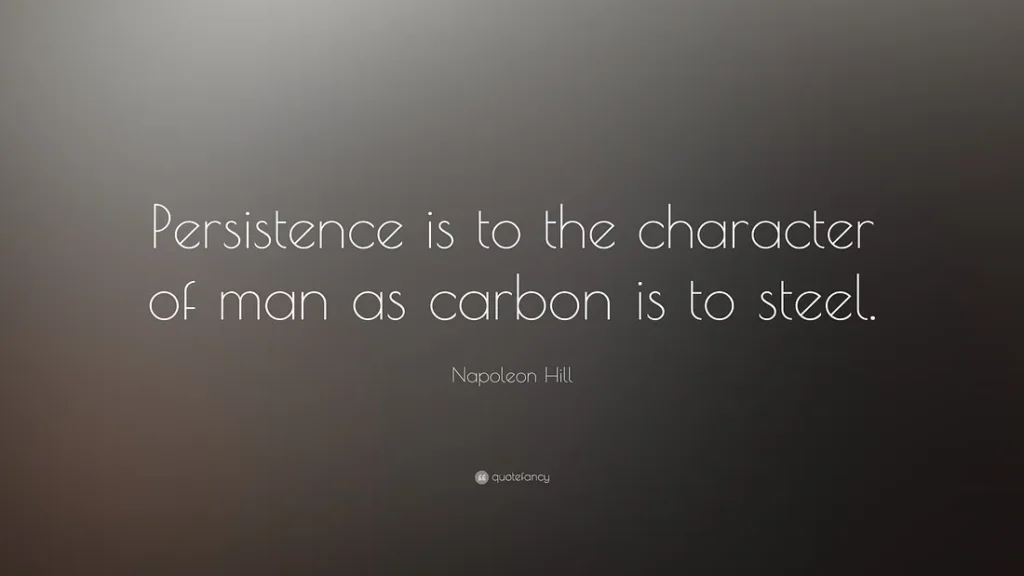
Symptoms of Lack of Persistence
- Unclear Goals: Failing to clearly define what you want to achieve.
- Procrastination: Delaying actions or decisions without valid reasons.
- Disinterest in Learning: Lack of enthusiasm for acquiring specialized knowledge.
- Indecision: Habitually avoiding responsibility and decision-making.
- Excuses Instead of Solutions: Relying on alibis rather than creating concrete plans to solve problems.
- Complacency: Being overly satisfied with the current state and not seeking improvement.
- Indifference: Ready to compromise and avoid confrontation rather than tackling challenges.
- Blaming Others: Shifting responsibility for mistakes and accepting unfavorable situations as unavoidable.
- Weak Desire: Insufficient motivation due to neglecting to choose strong driving forces.
- Quick to Quit: Eagerness to give up at the first sign of difficulty.
- Disorganized Plans: Lack of structured plans that are documented and reviewed.
- Missed Opportunities: Neglecting to act on ideas or seize opportunities when they arise.
- Wishful Thinking: Preferring to wish for success rather than actively working towards it.
- Compromising with Mediocrity: Settling for less instead of striving for substantial success.
- Seeking Shortcuts: Looking for easy ways to succeed rather than providing fair value and working hard.
- Fear of Criticism: Allowing fear of judgment to prevent action and pursuing goals.
How to Develop Persistence
- Define Your Purpose: Establish a clear and specific goal supported by a strong, burning desire for its achievement.
- Create a Detailed Plan: Develop a concrete plan for reaching your goal and take consistent, actionable steps.
- Protect Your Mindset: Keep a positive attitude and guard against negative influences and discouragement from others.
- Build Supportive Relationships: Form alliances with individuals who will encourage and motivate you to persist in your plans.
- Embrace the Power of Persistence: Understand that persistence is key to overcoming obstacles and achieving your objectives. Use it to turn setbacks into opportunities for growth.
By addressing these symptoms and implementing strategies to develop persistence, you can significantly improve your chances of success and achieve your goals.
Chapter 10: Power of the Master Mind
The driving force

The Role of Power in Accumulating Wealth
Power is crucial for turning plans into tangible outcomes, particularly in the pursuit of wealth. Without power, even the best-laid plans remain inert and ineffective.
Definition of Power: Power can be defined as “organized and intelligently directed knowledge.” This means that simply having knowledge is not enough; it must be organized into actionable plans and executed effectively.
Sources of Knowledge for Power:
- Infinite Intelligence: The universal source of wisdom and insight.
- Accumulated Experience: Lessons learned from past experiences.
- Experiment and Research: New knowledge gained through experimentation and investigation.
Knowledge from these sources can be transformed into power when it is organized into clear plans and actions.
The Master Mind Principle: A Master Mind group involves the coordination of knowledge and effort between two or more people, working in harmony toward a common goal. This principle has both economic and psychic dimensions:
- Economic: Practical benefits derived from collective effort.
- Psychic: The creation of a third, intangible force when minds come together in harmony.
When individuals collaborate effectively, the combined energy and insight available can enhance each person’s ability to achieve their objectives.
Attracting Wealth: Money is often elusive and requires a strategic approach similar to pursuing a romantic interest. To attract and retain wealth, the following elements are essential:
- Faith: Belief in the possibility of achieving your goals.
- Desire: A burning passion for wealth.
- Persistence: Consistent effort and determination.
- Action: Implementation of well-conceived plans.
Contrast Between Poverty and Wealth: Poverty can often replace wealth without the need for a plan or effort, while wealth requires deliberate planning and strategy. Riches are inherently shy and require intentional attraction through well-executed plans.
Achieving Wealth: While many people wish for wealth, only those who develop a clear, definite plan combined with a strong desire are likely to succeed. Wealth does not come from mere wishing; it is achieved through focused plans and persistent effort.
Chapter 11: The Mystery of Sex Transmutation
The meaning of the word “transmute” is, in simple language, “the changing or transferring of one element or form of energy into another.”

The Concept of Sex Transmutation
Sex transmutation is about channeling the powerful energy of sexual desire into other forms of creative or productive expression. The desire for sexual fulfillment is so strong that people often take significant risks for it. However, when this energy is redirected toward other pursuits—whether in art, business, or any profession—it retains its intensity and can fuel extraordinary achievements.
Many of history’s most successful men, from great artists to industrial magnates, have been driven by the influence of a woman. This motivation has led them to accomplish remarkable feats and amass significant wealth.
The Ten Mind Stimuli
The human mind can be “keyed up” to higher levels of creativity, enthusiasm, and desire through various stimuli. The most powerful among them are:
- The desire for sexual expression
- Love
- A burning ambition for fame, power, or financial gain
- Music
- Friendship, whether with the same or opposite sex
- A Master Mind alliance based on harmony for mutual advancement
- Shared suffering, like that experienced by those who are persecuted
- Autosuggestion
- Fear
- Narcotics and alcohol
A genius is someone who has learned how to elevate their thoughts to a point where they can tap into knowledge not usually accessible through ordinary thinking. This heightened state of mind is often referred to as “creative imagination” or the sixth sense. It allows ideas to flow from sources like infinite intelligence, the subconscious, or even the thoughts of others.
When the brain is stimulated by one or more of these stimuli, it transcends ordinary thought and opens up new dimensions of creativity and problem-solving.
The Role of Sex Energy in Genius
Sex energy is the driving force behind all geniuses. Every great leader, builder, or artist has harnessed this energy, not merely for physical expression, but as a creative force. The desire for sexual expression is the most powerful of all human emotions. When controlled and redirected, it can elevate a person to extraordinary levels of achievement.
Most people are driven not by logic but by emotions. The creative mind is activated by emotions, with sex being the strongest among them. A person who can take the intense energy of sexual desire and channel it into other efforts, such as sales or creative work, has mastered the art of sex transmutation.
Love, Romance, and Sex as Drivers of Success
Love, romance, and sex are potent emotions capable of pushing people to achieve greatness. Love, in particular, acts as a stabilizer, ensuring balance, poise, and constructive effort in one’s pursuits. Encouraging these emotions as dominant thoughts, while suppressing negative ones, is crucial. The mind thrives on the thoughts it is fed, and through willpower, one can cultivate positive emotions and transform negative ones.
The emotion of love enhances a person’s artistic and aesthetic qualities, leaving a lasting impact on their soul. A person who cannot be inspired by love is missing a vital force that drives human achievement.
The Influence of Women on Men’s Success
A man’s strongest motivation often comes from his desire to please a woman. Men who achieve great wealth, power, or fame often do so with the intention of impressing or satisfying a woman. Without the presence of women in their lives, the pursuit of wealth would lose much of its meaning for most men. This desire gives women immense power over men, sometimes even the power to break them.
Chapter 12: The Subconscious Mind
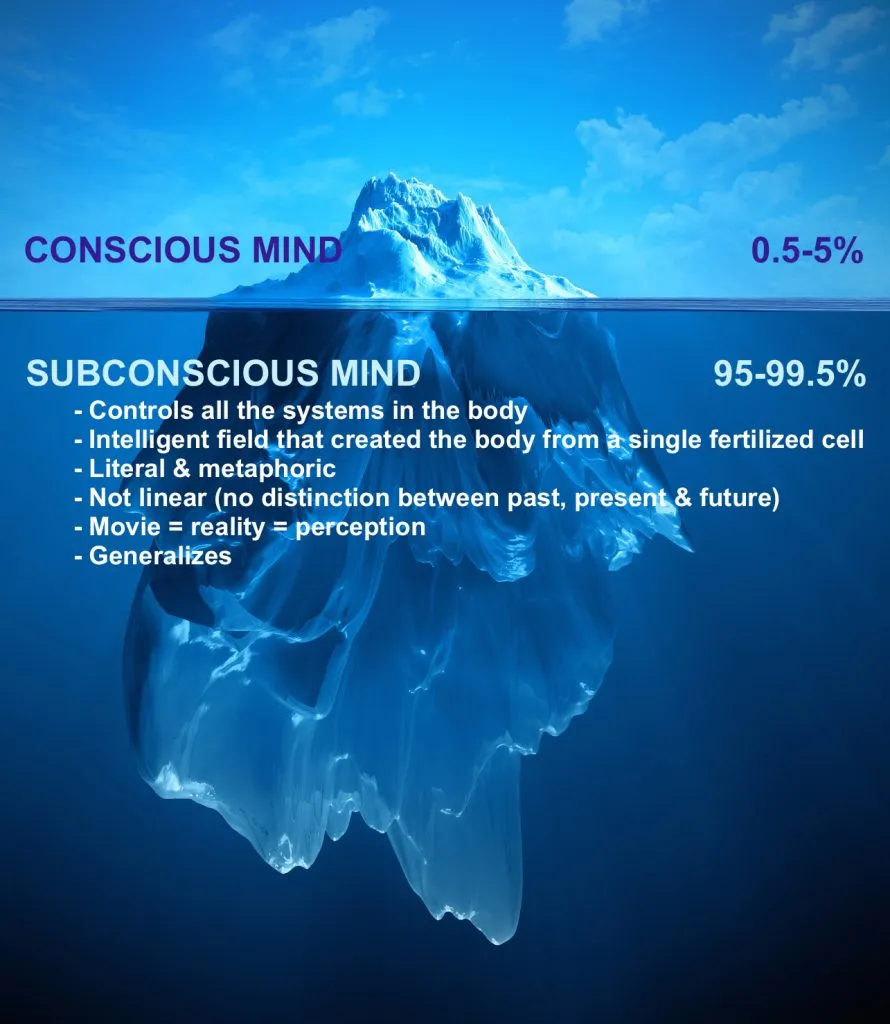
Understanding the Subconscious Mind
The subconscious mind can be thought of as a vast storage system where every thought, idea, or impression received through the five senses is cataloged and stored. Just like a filing cabinet, these thoughts can be retrieved when needed. The subconscious doesn’t discriminate; it absorbs everything—positive or negative.
You have the power to intentionally plant thoughts, desires, or plans into your subconscious, especially those infused with strong emotions like faith. While you can’t completely control your subconscious mind, you can guide it by regularly feeding it the thoughts and goals you want it to work on. This process requires the development of habits, as outlined in the discussion on faith.
It’s crucial to understand that your subconscious operates constantly, whether you consciously influence it or not. This means that if you let negative thoughts like fear or poverty dominate your mind, they will seep into your subconscious. However, by mastering these impulses and replacing them with more positive and constructive thoughts, you can direct your subconscious toward achieving your desires.
Your subconscious mind is more responsive to thoughts charged with emotion than those that are purely logical. It understands the language of feelings better than cold reason. To harness this, it’s important to focus on the seven major positive emotions and avoid the seven major negative emotions when programming your subconscious mind.
The Seven Major Positive Emotions
- Desire
- Faith
- Love
- Sex
- Enthusiasm
- Romance
- Hope
The Seven Major Negative Emotions
- Fear
- Jealousy
- Hatred
- Revenge
- Greed
- Superstition
- Anger
Positive and negative emotions cannot coexist in your mind at the same time. One will always dominate. It’s your responsibility to ensure that positive emotions are the primary influence on your thoughts. The law of habit will assist you in this, making it easier over time to maintain a positive mental state. When one type of emotion is present, the other cannot exist.
Chapter 13: The Brain

Thoughts that are intensified or “stepped up” by strong emotions vibrate at a much higher frequency than ordinary thoughts. This elevated vibration enables these thoughts to be transmitted from one mind to another, like signals broadcast through the airwaves.
The subconscious mind acts as the brain’s “sending station,” broadcasting these vibrating thoughts. Meanwhile, the creative imagination functions as the “receiving set,” picking up thought vibrations from the ether.
Using your mind’s “broadcasting station” is straightforward when you understand and apply three key principles: the subconscious mind, creative imagination, and autosuggestion. The process starts with a strong desire, which activates these principles and allows thoughts to be transmitted and received.
Despite all the advancements in culture and education, humanity still understands very little about the intangible force of thought—the most powerful and mysterious of all intangibles. The physical brain and its complex mechanisms that translate thought into reality remain largely a mystery, even to the most learned minds.
Chapter 14: The Sixth Sense
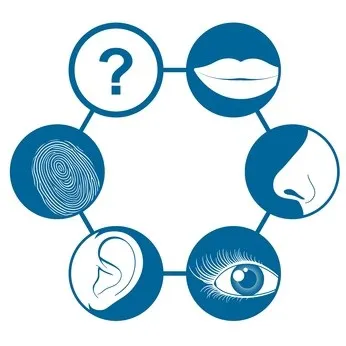
The sixth sense is a part of the subconscious mind, often referred to as the creative imagination. It serves as a “receiving set” through which ideas, plans, and thoughts suddenly appear in the mind—often in the form of “hunches” or “inspirations.”
In my experience, while being truly great is an extraordinary achievement, the next best thing is to emulate greatness by adopting the feelings and actions of those who have left a lasting impact. I developed a habit of reshaping my own character by imitating the lives of men whose achievements I deeply admired.
My approach involved a nightly ritual: before going to sleep, I would close my eyes and imagine sitting at a council table with these great men. Not only did I envision myself among them, but I also took on the role of chairman, leading the group.
The purpose of this exercise was to rebuild my character, combining the strengths of my imaginary counselors into my own personality. I tailored my conversations with them based on the traits I most wanted to develop at any given moment. I meticulously studied their lives, and after months of this practice, I was surprised to find that these imaginary figures started to feel real.
One of the benefits of growing older is the courage it sometimes brings—the courage to be honest, no matter what others might think or say.
Originally, I conducted these council meetings with imaginary beings to impress upon my subconscious mind certain qualities I wanted to develop, using the principle of autosuggestion.
Desire is the starting point of all achievement, and true fulfillment comes with the understanding that grows from knowledge—understanding of oneself, of others, of the laws of nature, and the recognition of happiness.
Chapter 15: How to Outwit the Six Ghosts of Fear
As you study these six enemies, take a moment to search yourself carefully—they may be lurking in your subconscious, making them hard to detect. Remember that these “six ghosts of fear” are just that—ghosts, existing only in the mind. Despite their intangible nature, these fears can cause real damage, as uncontrolled imagination often leads to the creation of these mental phantoms. Though they are not physically real, they can be just as dangerous as if they were.
Indecision can crystallize into doubt, and together, they become fear. This blending process often happens slowly, making these three enemies particularly insidious. They grow quietly, unnoticed, until they have taken root.
To defeat an enemy, you must first know it—its name, habits, and where it resides.
The Six Basic Fears:
- Fear of Poverty
- Fear of Criticism
- Fear of Ill Health
- Fear of Loss of Love
- Fear of Old Age
- Fear of Death
These fears are nothing more than states of mind, and your state of mind is something you can control and direct.
Every human has the power to fully control their own mind. With this control, you can choose to open your mind to the thought impulses from others, or you can shut the door and admit only the thoughts you wish to entertain.
The Fear of Poverty
To attract wealth, you must refuse to accept circumstances that lead to poverty. Here, “riches” means more than just financial wealth—it encompasses spiritual, mental, and material abundance. If you desire riches, you must determine what form they will take and how much you need to feel satisfied.
A state of mind cannot be bought; it must be created by you.
Symptoms of the Fear of Poverty:
- Indifference
- Indecision
- Doubt
- Worry
- Over-caution
- Procrastination
The Fear of Criticism
The origin of this fear is unclear, but it’s certain that many suffer from it in a highly developed form. This fear may stem from our inherited nature, which inclines us to criticize others as a way to justify our own actions.
Manufacturers, especially in the clothing industry, have capitalized on this fear. Fashion trends change frequently—not because consumers demand it, but because manufacturers know they can sell more by preying on our fear of being criticized for being out of style.
The fear of criticism robs us of initiative, stifles creativity, limits individuality, and erodes self-confidence, causing damage in countless ways. Criticism is one of those things everyone has in abundance and often gives freely, whether asked for or not.
Symptoms of the Fear of Criticism:
- Self-consciousness
- Lack of poise
- Personality issues
- Inferiority complex
- Extravagance
- Lack of initiative
- Lack of ambition
The Fear of Ill Health
The fear of illness is so powerful that it can create physical symptoms even when there is no real cause for concern. The human mind is incredibly powerful—it can build, or it can destroy.
Symptoms of the Fear of Ill Health:
- Negative Autosuggestion
- Hypochondria
- Lack of exercise
- Susceptibility to illness
- Self-coddling
- Intemperance
The Fear of Loss of Love
This fear, rooted in our need for love and connection, can be the most painful of all. It often leads to mental distress, sometimes even insanity, as jealousy and other forms of emotional imbalance take hold.
Symptoms of the Fear of Loss of Love:
- Jealousy
- Faultfinding
- Gambling
The Fear of Old Age
This fear is fueled by two main concerns: distrust of others and fear of the unknown, particularly the afterlife. Social conditioning also contributes to this fear, as does the possibility of declining health and loss of independence.
Symptoms of the Fear of Old Age:
- Slowing down and developing an inferiority complex around age forty, believing one is “slipping” due to age.
- Speaking apologetically about being “old” once past forty or fifty, instead of embracing the wisdom that comes with maturity.
- Dressing in a way that attempts to appear younger, which often results in ridicule.
The Fear of Death
For many, this is the most terrifying of all fears. The uncertainty surrounding what happens after death has led to countless theories and beliefs, which often increase our fear rather than alleviate it.
However, this fear is unnecessary. Death is inevitable; it’s a natural part of life. Instead of fearing it, accept it as a necessity. Death may not be as dreadful as it’s often portrayed. It might be a transition, or simply a peaceful, eternal sleep—either way, it’s nothing to fear.
Symptoms of the Fear of Death:
- Focusing on dying instead of living fully, often due to a lack of purpose or meaningful occupation. This fear is more common among the elderly but can affect younger people as well. The best remedy for this fear is a strong desire for achievement and a life filled with service to others. Busy people rarely have time to worry about death.
Overcoming the Six Basic Fears
These fears manifest as worry when indecision takes hold. Free yourself from the fear of death by accepting it as an unavoidable event. Overcome the fear of poverty by deciding to make the best of whatever wealth you can accumulate. Conquer the fear of criticism by deciding not to worry about what others think or say. Banish the fear of old age by embracing it as a blessing that brings wisdom and self-control. Defeat the fear of ill health by ignoring symptoms and focusing on health. Finally, master the fear of loss of love by deciding to live without it, if necessary.
A mind filled with fear not only hinders your own ability to act intelligently, but it also spreads these destructive vibrations to others, harming their chances for success as well.
Conclusion
The core message of Think and Grow Rich is that success, whether financial, personal, or professional, begins in the mind. Through the power of thought, desire, and belief, individuals can shape their reality and achieve their goals. The book emphasizes the importance of a burning desire, unwavering faith, and persistent effort in transforming thoughts into material wealth or personal achievement.
Napoleon Hill outlines key principles—such as autosuggestion, organized planning, and the power of the subconscious mind—that guide readers to harness their mental faculties and direct them towards their desired outcomes. He underscores the necessity of overcoming fear, indecision, and doubt, which are often the greatest barriers to success.
Ultimately, Think and Grow Rich is a blueprint for cultivating a success-oriented mindset, reminding readers that riches and achievements are not just products of luck or circumstance, but of disciplined thought, strong will, and consistent action. It teaches that anyone, regardless of their background, can attain their dreams if they follow the principles of desire, faith, and persistence.